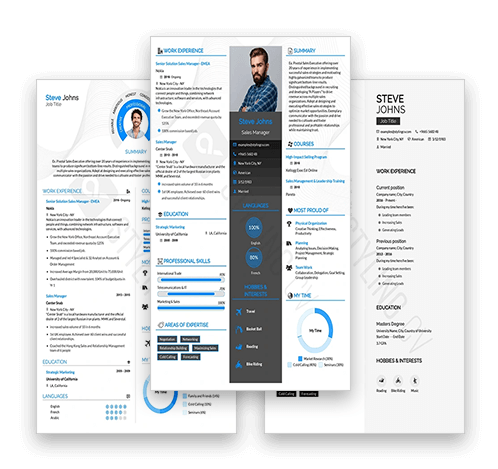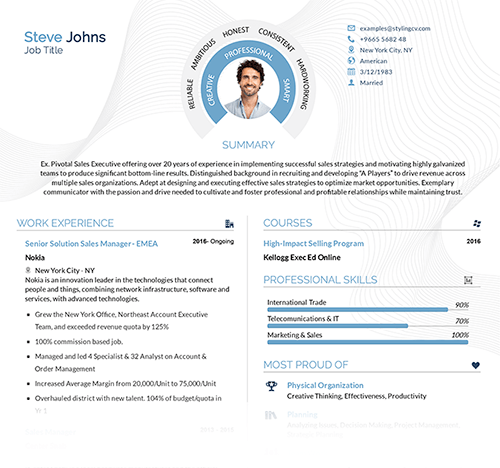Complete guide for foreigners seeking jobs in Saudi Arabia in 2025. Learn about work visas, iqama requirements, Saudization impact, and the best industries for expats.
Sarah Reynolds
Content Specialist
I’m Sarah Reynolds, a Content Specialist at StylingCV, where I help professionals tell their stories with clarity and confidence.My focus is on creating content that bridges the gap between job seekers and hiring managers — offering actionable advice on resume writing, interview preparation, and personal branding. I’m passionate about turning career challenges into clear, strategic steps that lead to meaningful opportunities.At StylingCV, I work with an incredible team to deliver resources that empower people to present their best selves — both on paper and in person.Let’s connect if you’re passionate about career growth, creative communication, or making resumes that truly stand out.
Sources & References
- ✓ Career development best practices from leading HR associations
- ✓ Industry research and surveys
- ✓ Expert interviews and case studies
- ✓ Verified by professional career advisors
Last updated: November 26, 2025
How to Get a Job in Saudi Arabia as a Foreigner [2025 Complete Guide]
Complete guide for foreigners seeking jobs in Saudi Arabia in 2025. Learn about work visas, iqama requirements, Saudization impact, and the best industries for expats.
Sarah Reynolds
Content Specialist
# How to Get a Job in Saudi Arabia as a Foreigner [2025 Complete Guide]
📖 Introduction: Saudi Arabia’s Growing Expat Opportunities and Vision 2030 Impact
Saudi Arabia is rapidly transforming its economy and workforce landscape under the ambitious Vision 2030 initiative. This strategic framework aims to diversify the economy beyond oil, boost private sector growth, and increase employment opportunities for both Saudis and expatriates. As a result, the Kingdom has become an increasingly attractive destination for foreign professionals seeking rewarding careers in the Middle East.
With over 10 million expatriates currently living and working in Saudi Arabia, the country remains one of the largest expat hubs in the Gulf Cooperation Council (GCC). The government’s push for technological innovation, infrastructure development, and service sector expansion continues to create new job openings for foreigners, especially in industries aligned with Vision 2030 priorities.
This comprehensive 2025 guide will help you understand the process of securing a job in Saudi Arabia as a foreigner, including visa regulations, industry insights, cultural considerations, and practical tips to enhance your chances of success.
—
—
🎯 Understanding the Saudi Work Visa System
Before applying for jobs in Saudi Arabia, it’s essential to understand the local work visa system, which governs legal employment for foreigners.
Iqama: The Saudi Residency Permit
Once employed, foreign workers are issued an Iqama, a residency permit that allows them to live and work legally in Saudi Arabia. The Iqama is linked to the employer’s sponsorship and must be renewed annually. It also serves as the primary identification document within the Kingdom.
Sponsorship System (Kafala)
Saudi Arabia uses a sponsorship system, where a Saudi employer (or authorized representative) acts as your sponsor throughout your stay. The sponsor handles your visa application, Iqama issuance, and other legal formalities. Changing jobs within Saudi Arabia requires sponsor approval, making it critical to maintain good employer relations.
Types of Work Visas
Foreign workers typically enter Saudi Arabia on one of the following visa types:
- Employment Visa: Issued after securing a job offer; allows the holder to enter Saudi Arabia for work.
- Business Visa: For short-term business visits but does not permit employment.
- Investor/Partner Visa: For foreign investors involved in Saudi businesses.
The employment visa process is the most common pathway for foreign workers and requires a valid job offer and sponsorship from a Saudi employer.
—
—
📝 Step-by-Step Process to Get a Job in Saudi Arabia
1. Job Search
Begin by identifying the industries and companies hiring foreign talent. Use popular job portals such as:
- Bayt.com
- GulfTalent
- Naukrigulf
Networking through industry events and professional groups is also highly beneficial.
2. Application and Interview
Tailor your CV to highlight relevant skills and experience, keeping in mind that Saudi employers value education credentials and professional certifications. Prepare for virtual or in-person interviews, focusing on your adaptability and cultural awareness.
3. Receiving a Job Offer
Once a Saudi employer extends an official job offer, review the contract carefully for salary, benefits, and job responsibilities.
4. Visa Application Process
Your employer initiates the employment visa process by applying through the Ministry of Human Resources and Social Development (HRSD). Once approved, you obtain an entry visa to Saudi Arabia.
5. Arrival and Iqama Issuance
Upon arrival, your employer will assist with medical tests, biometrics, and Iqama issuance. The entire process typically takes 2 to 4 weeks.
—
—
🇸🇦 Saudization and Its Impact on Expats
Nitaqat System
The Nitaqat system is a Saudization policy designed to increase Saudi nationals’ participation in the workforce. Companies are classified into bands (Platinum, Green, Yellow, Red) based on their percentage of Saudi employees. Firms with higher Saudization levels enjoy benefits, whereas those with low compliance face restrictions.
Effect on Foreign Workers
Saudization can limit opportunities for foreigners in certain job categories, especially low-skilled roles. However, many sectors exempt from Saudization quotas, such as oil and gas, healthcare, and IT, continue to rely heavily on foreign expertise.
Exempt Industries
Foreign workers are most welcomed in:
- Energy sector (oil, gas, petrochemicals)
- Healthcare and pharmaceuticals
- Information technology and digital services
- Engineering and construction
- Education and training
Understanding Saudization helps foreign job seekers target sectors and roles with better prospects.
—
—
🏆 Best Industries for Foreign Workers
1. Oil & Gas
Saudi Arabia is the world’s largest oil exporter, with Aramco and other major firms constantly seeking skilled engineers, geologists, and project managers. Salaries range from SAR 12,000 to SAR 40,000 monthly depending on experience.
2. Healthcare
With a focus on expanding healthcare infrastructure, Saudi Arabia demands doctors, nurses, medical technicians, and administrators. Monthly salaries for doctors can range from SAR 15,000 to SAR 50,000, while nurses earn SAR 8,000 to SAR 20,000.
3. Technology
The tech sector is rapidly growing, with demand for software developers, cybersecurity experts, and data scientists. Salaries typically range from SAR 10,000 to SAR 30,000 monthly.
4. Construction and Engineering
Mega projects like NEOM and the Red Sea Project require construction managers, civil engineers, and architects. Monthly salaries vary between SAR 10,000 and SAR 35,000.
5. Education
International schools and universities hire teachers, especially in English, science, and IT. Salaries typically range from SAR 7,000 to SAR 20,000 per month, often including housing allowances.
—
—
📋 Required Documents and Qualifications
To apply for jobs and visas, you must prepare:
- Valid passport (minimum 6 months validity)
- Educational certificates (bachelor’s degree or higher preferred)
- Professional licenses or certifications (if applicable)
- Updated CV/resume
- Passport-sized photographs
- Medical fitness certificate (upon arrival)
- Police clearance certificate (may be required)
- Employment offer letter from a Saudi sponsor
Equivalency of foreign educational qualifications is often necessary through the Saudi Ministry of Education.
—
—
💰 Salary Expectations and Benefits for Expats
Salary Ranges
- Entry-level professionals: SAR 7,000 – SAR 12,000/month
- Mid-level specialists: SAR 12,000 – SAR 25,000/month
- Senior roles and managers: SAR 25,000 – SAR 50,000+/month
Benefits
Common employment benefits include:
- Annual airfare allowance for home country visits
- Housing allowance or company-provided accommodation
- Health insurance
- End-of-service gratuity (severance pay based on years of service)
- Paid annual leave (typically 21-30 days)
- Education allowance for dependents (in some cases)
—
—
🤝 Cultural Considerations and Work Environment
Saudi Arabia’s work culture is influenced by Islamic traditions and local customs:
- Workweek: Sunday to Thursday, with Friday and Saturday as weekends.
- Business Etiquette: Formal greetings, conservative dress codes, and respect for hierarchy are standard.
- Language: Arabic is the official language; however, English is widely used in business.
- Gender Interaction: Gender segregation is common in workplaces, though mixed offices exist in multinational companies.
- Prayer Times: Work schedules accommodate five daily prayers.
Understanding and respecting these cultural norms enhances workplace harmony and professional relationships.
—
—
⚠️ Common Challenges and How to Overcome Them
1. Sponsorship Restrictions
Limited freedom to change jobs without sponsor consent can be challenging. Build strong employer relationships and understand your contract terms.
2. Saudization Pressure
Competition with local talent can limit some job opportunities. Focus on specialized skills and industries exempt from Saudization.
3. Cultural Adjustment
Adapt to local customs respectfully. Engage in cultural orientation programs and seek support from expat communities.
4. Language Barrier
Improving Arabic language skills can aid social integration and career advancement.
—
—
💡 Tips for Success
- Research Employers: Target reputable companies, preferably those with a history of hiring expats.
- Network: Use LinkedIn and professional associations to connect with industry insiders.
- Prepare Thoroughly: Customize your CV and cover letter for each application.
- Verify Contracts: Ensure clarity on salary, benefits, and job duties before signing.
- Stay Informed: Keep abreast of labor law changes and Saudization policies.
- Cultural Sensitivity: Demonstrate respect for Saudi values and workplace norms.
- Continuous Learning: Pursue certifications and skills aligned with Vision 2030 sectors.
—
—
🎉 Conclusion
Securing a job in Saudi Arabia as a foreigner requires a clear understanding of the visa system, Saudization policies, and the evolving economic landscape shaped by Vision 2030. By targeting the right industries, preparing the required documentation, respecting cultural norms, and navigating potential challenges prudently, foreign professionals can build successful and rewarding careers in the Kingdom.
With the right approach and preparation, Saudi Arabia offers vast opportunities for expatriates aiming to advance their careers in one of the world’s fastest-changing markets.
—
🚀 Ready to Build Your Saudi-Ready Resume?
Create your ATS-optimized, Saudi-specific resume in minutes with StylingCV AI. Our templates are designed for:
- ✅ Vision 2030 alignment
- ✅ Saudi ATS systems
- ✅ Bilingual formatting (Arabic + English)
- ✅ Saudization keywords
- ✅ NEOM & giga-project roles
👉 Start Building Your Resume Now
Frequently Asked Questions
Sarah Reynolds
Content Specialist
I’m Sarah Reynolds, a Content Specialist at StylingCV, where I help professionals tell their stories with clarity and confidence.My focus is on creating content that bridges the gap between job seekers and hiring managers — offering actionable advice on resume writing, interview preparation, and personal branding. I’m passionate about turning career challenges into clear, strategic steps that lead to meaningful opportunities.At StylingCV, I work with an incredible team to deliver resources that empower people to present their best selves — both on paper and in person.Let’s connect if you’re passionate about career growth, creative communication, or making resumes that truly stand out.
Sources & References
- ✓ Career development best practices from leading HR associations
- ✓ Industry research and surveys
- ✓ Expert interviews and case studies
- ✓ Verified by professional career advisors
Last updated: November 26, 2025
Related Posts
Tags
⚡ Create Your Resume in Just 5 Minutes
Templates designed by hiring experts. No design skills needed.
 Building Your Resume Now
⭐ 4.8/5 Rating
Building Your Resume Now
⭐ 4.8/5 Rating
3,000+ Success Stories


